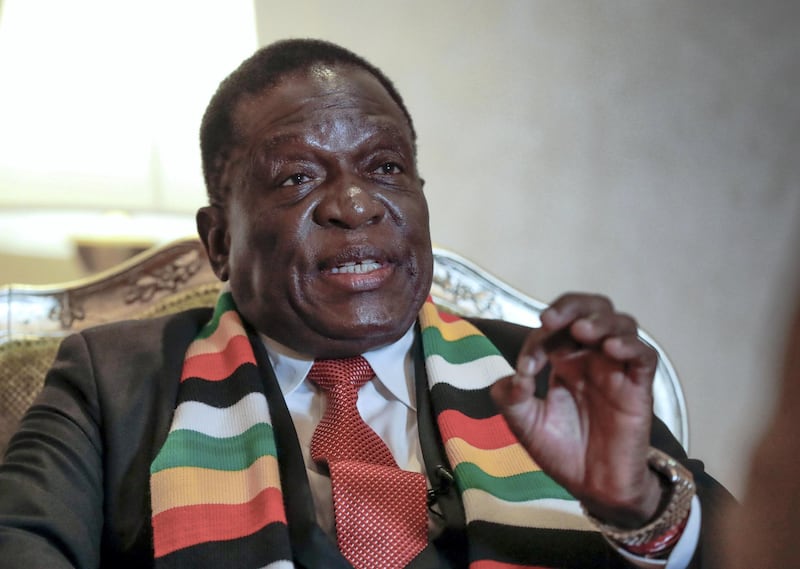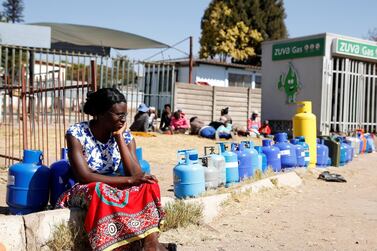When darkness falls during the warm summer nights across Zimbabwe, families and businesses spring to life; this is when they get only four to five hours of electricity than they are likely to get during the entire day.
"It's a tough time, having to run at night," said Moses Chipurura, who runs a small wall-plaster manufacturing plant in the capital, Harare.
He and his staff of eight try to fit as much work into the early hours as they can, while his wife runs the stove and washing machine at home and also supervises the children as they do their homework.
Water levels at Kariba Dam, the country's main hydro-electric power plant on the Zambezi river, are critically low as the region suffers its worst drought in a century.
To make matters worse, Hwange Thermal Power Station, the biggest coal-fired power plant in the country, regularly breaks down.
As a result, the only time electricity is available is from late evening into the early morning hours, when demand is at its lowest. Most Zimbabweans are without electricity for up to 18 hours a day.
Mr Chipurura, however, takes whatever he can get.
"This factory consumes a lot of power, so we work in the evenings and get home after 2am. We don't know when this is going to end."
When electricity imports from neighbouring South Africa were temporarily suspended last week after it experienced power cuts of its own, Zimbabwe endured a full 24-hour cycle without electricity.
The power cuts are the latest in a series of miseries Zimbabweans must endure after about two decades of disastrous economic and political policies under the ruling Zanu PF party, which led to job losses, steadily destroyed industry and brought the quality of life to a bare minimum.
Now the drought is pushing what’s left of the country’s depleted farming capacity into oblivion.
Aid agencies said that more than 60 per cent of the population faced imminent starvation, with about 5.5 million people in the rural areas described as "food insecure".
"There's little electricity, running water is very limited and on top of that, importing food is very difficult because of the overall financial situation," Hilal Elver, UN Special Rapporteur on the right to food, said.
“Child deaths from severe malnutrition have been rising in the past few months. [About] 90 per cent of Zimbabwean children aged six months to two years are not consuming the minimum acceptable [levels of] diet.”
Former president Robert Mugabe introduced land reforms in the early 2000s that saw up to 4,000 commercial farms turned over to political supporters.
The ensuing collapse of agriculture, which had consistently accounted for 15 to 20 per cent of the country's gross domestic product, dealt the economy a heavy blow, and there is no sign it will recover anytime soon.
Without a land title and few formal agricultural skills, the new farmers were unable to secure capital to buy equipment, fertiliser and other essentials.
In years of good rain they were, nonetheless, able to grow enough food to, at least, feed themselves. Now, in a time of drought, many face starvation.
"If commercial farming had still been on the land [in operations], we would not have had crop failures this year," said John Robinson, an economist in Harare.
Only about 5 per cent of Zimbabwe's arable land is equipped with irrigation systems, the Food and Agriculture organisation said, and it is likely that less than half of that is actually irrigated owing to decades of misuse or neglect.
"The commercial farmers would have irrigated properly, yields would have been good and we would not have had to import another million tonnes of maize," Mr Robinson said.
A brief moment of hope occurred almost exactly two years ago when Mugabe, who died in a Singapore hospital bed earlier this year, was toppled in a military coup.
His successor, Emmerson Mnangagwa, held a snap election to give the coup a veneer of legitimacy, and declared Zimbabwe ‘open for business’.
Initially, things looked up and hopes were high. Farmers who lost land during the Mugabe era were promised compensation, onerous local partnership laws for foreign investors were scrapped and Mr Mnangagwa courted world leaders, especially old allies, Russia and China.
One of his boldest steps was to appoint seasoned technocrats to head the Reserve Bank of Zimbabwe and finance ministry, indicating a more market-friendly direction after years of Marxist-inspired policy.
Yet, not much has come about and the country is once again on teetering on the verge of disaster.
"The current political and socio-economic systems are not creating the results we desire," said Vince Musewe, an economist in Harare.
“To change the results, we must change the systems. It has nothing to do with personalities.”
The World Bank said an additional one million Zimbabweans entered extreme poverty this year. The drought has fuelled a steep rise in the price of basic commodities. with food and non-food inflation hitting 320 per cent and 195 per cent, respectively, in July 2019.
Foreign companies that had begun reinvesting in Zimbabwe and trading with local companies are now pulling back. Beverage manufacturer Schweppes Zimbabwe stopped producing its flagship cordial drink, Mazoe Orange Crush, after Coca-Cola in the United States stopped supplying essential ingredients.
Schweppes Zimbabwe owes Coca-Cola $10 million (Dh36.7m). Even if the company can scrape together the money, the shortage of foreign currency in Zimbabwe's banking system is expected to make repayments a challenge.
Earlier this year, the government introduced a new currency after a decade of using foreign denominations that include the US dollar, the euro and South Africa's rand.
Launched at parity with the greenback, the new currency is now trading at around 17 to the dollar. Only a shortage of supply of notes is preventing a free fall against the dollar , market observers said.
Of immediate concern to Zanu PF must be the dire state of the army, which has been central to keeping the population in check. Troops have regularly been seen on the streets in recent months, tackling protesters who object to the state the country is in.
In November, however, Minister of Defence Oppah Muchinguri-Kashiri told Parliament that soldiers were now starving, ill and rapidly losing the capacity to do their job.
The situation was so dire that joint exercises planned in Zimbabwe with the armed forces of South Africa, Zambia and Botswana were cancelled, as the African nations refused to subject their solders to the conditions in Zimbabwe.
"We are expected to host other defence forces but no-one wants to come here because of these [adverse] conditions," Ms Muchinguri-Kashiri told parliament, according to South African news site TimesLive.
Zanu PF, meanwhile, held its annual conference this past week, where it was supposed to thrash out ideas to end the economic collapse. Few, however, are optimistic that any fresh inspiration will be forthcoming from the party's leadership.
Jealousy Mawarire, spokesman for the National Patriotic Front, an opposition party, said after dozens of such conferences with no new direction, Zanu PF was unlikely to change anything now.
“We expected those who expedited the coup in November 2017 to come up with ideas. They haven’t and now we find ourselves in [a] grave. They have failed. In fact, we were better off in November 2017," he said.
“As long as Zanu PF is there, the economy will be in trouble.”







